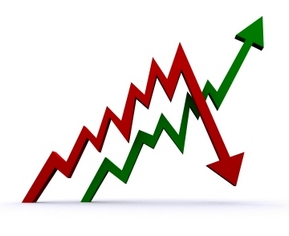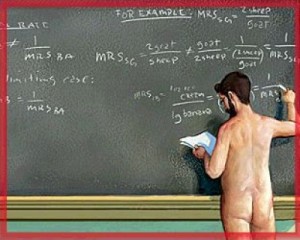I have long argued that most economists can’t predict future market or economic developments even if the future walks up to them and hits them in face. How dumb are they? (see full article below)
The combination of an improving job market, pent-up consumer demand, less drag from U.S. government policies and a brighter global outlook is boosting optimism for the rest of 2014.
“We think that once temperatures return to more normal levels, we will see a lot of pent-up demand released,” said Gus Faucher, senior economist at PNC Financial Services. “People will be buying cars and homes and making other purchases that they put off during the winter.”
Yep, it’s the weather everyone. As soon as that snow melts everyone will run out to buy homes and cars, propelling the US Economic growth much higher. Give me a break. Of course, the brilliant economists above don’t take massive credit, overvaluation, speculation, equity markets, etc… bubbles into consideration. For them, it is irrelevant. Yet, the first thing they should learn is as follows. It is not the economy that drives markets forward, it is the financial markets that dictate future economic developments.
That is the reason why recessions “officially” start 6-9 months after stock market tops. As per our mathematical and timing work we anticipate the markets to break down shortly, bringing the US Economy into a severe “official” recession by the end of the year. So, you have a choice. You can listen to such economists and go out to buy tech stocks OR you can start getting ready for the bear market of 2014-2017. If you would be interested in learning when the bear market will start (to the day) and it’s upcoming internal composition, please Click Here.
Did you enjoy this article? If so, please share our blog with your friends as we try to get traction. Gratitude!!!
Click here to subscribe to my mailing list
More Proof That Most Economists Are Waste Of Space Google
AP Writes: Why economists say 2014 could prove breakout year
WASHINGTON (AP) — Once this year’s harsh weather has faded, the U.S. economy could be poised for a breakout year — its strongest annual growth in nearly a decade.
The combination of an improving job market, pent-up consumer demand, less drag from U.S. government policies and a brighter global outlook is boosting optimism for the rest of 2014.
Many analysts foresee the economy growing 3 percent for the year, after a weak first quarter that followed a stronger end of 2013. It would be the most robust expansion for any year since 2005, two years before the Great Recession began.
One reason for the optimism: The government estimated Thursday that the economy grew at a 2.6 percent annual rate in the October-December quarter, up from its previous estimate of 2.4 percent. Fueling the gain was the fastest consumer spending for any quarter in the past three years.
The numbers pointed to momentum entering 2014 from consumers, whose spending drives about 70 percent of the economy.
Analysts cautioned that the brutal winter weather has depressed spending in the January-March. And they think economic growth has likely slowed to an annual rate of 2 percent or less this quarter. Yet that slowdown could pave the way for a solid bounce-back in the April-June quarter. Many think growth will be fast enough the rest of the year for the economy to grow at least 3 percent for all of 2014.
“We think that once temperatures return to more normal levels, we will see a lot of pent-up demand released,” said Gus Faucher, senior economist at PNC Financial Services. “People will be buying cars and homes and making other purchases that they put off during the winter.”
Economists have suggested before that the recovery appeared on the verge of acceleration, only to have their expectations derailed by subpar growth that left unemployment at painfully high levels.
This time, there’s a growing feeling that the improvements can endure.
“We are looking for progressively faster growth as the year goes on,” said Doug Handler, chief U.S. economist at IHS Global Insight.
The National Association for Business Economics predicts that the economy will grow 3.1 percent this year, far higher than the lackluster 1.9 percent gain in 2013.
If that forecast proves accurate, it would make 2014 the strongest year since the economy, as measured by the gross domestic product, expanded 3.4 percent in 2005. Since the Great Recession ended in June 2009, annual growth over the past four years has averaged a weak 2.2 percent.
The U.S. economy has been hit by a series of blows since then — from a Japanese tsunami and European debt crisis, which hurt U.S. exports, to Washington budget fights, which fueled uncertainty about the government’s spending and tax policies.
Tax increases and deep spending cuts that took effect in 2013 subtracted an estimated 1.5 percentage points from growth last year.
With Congress having reached a budget agreement and a deal to raise the government’s borrowing limit, companies now have more certainty about federal fiscal policies.
“We now seem to have a truce on budget issues, which means uncertainties have faded.” Faucher said. “That is a big reason growth will be stronger.”
Also helping will be an improving outlook overseas. Economies in Europe are strengthening, which should boost U.S. exports. In addition, the U.S. job market is improving.
The Labor Department said Thursday that the number of people seeking unemployment benefits last week reached its lowest level since November — an encouraging sign that hiring should be picking up.
In February, U.S. employers added 175,000 jobs, far more than in the two previous months. Though the unemployment rate rose to 6.7 percent from a five-year low of 6.6 percent, it did so for an encouraging reason: More people grew optimistic about their job prospects and began seeking work. The unemployment rate rose because some didn’t immediately find jobs.
With more people working, more consumers will have money to spend to boost the economy.
“The last missing link to a stronger recovery was income growth, and now we are seeing that,” said Joel Naroff, chief economist at Naroff Economics.
Unexpected events might yet prove that analysts are overly optimistic. But at the moment, economists don’t expect the standoff with Russia over Ukraine or the Federal Reserve’s paring of its economic stimulus to destabilize global markets or derail the U.S. recovery.
Naroff said the consensus view might even prove too pessimistic. He said he thought economic growth could achieve a vigorous 4.4 percent annual rate in the April-June quarter if pent-up consumer demand tops estimates. And he said growth could exceed 3.5 percent in the second half of this year.




